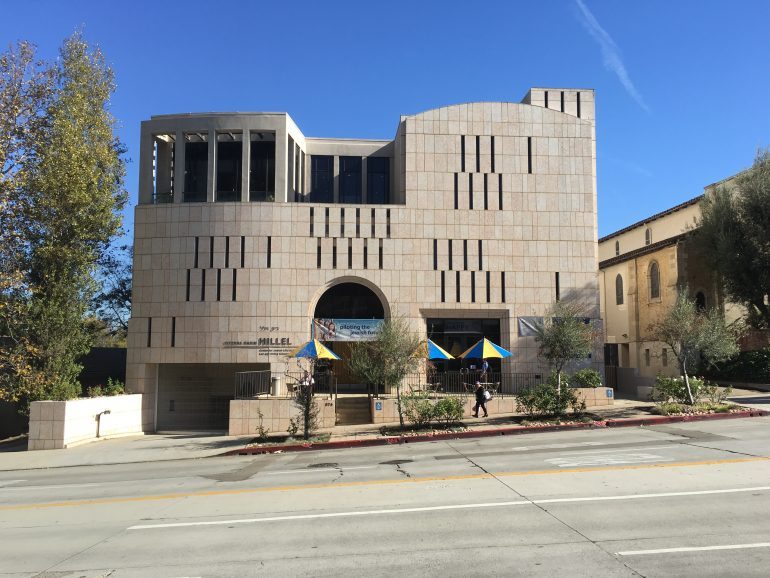Click here to see Ha’Am’s Fall 2017 Print Edition: “Growing Pains”
Synagogues around the country recognize that evening services on Yom Kippur are a good opportunity to fundraise, and Hillel at UCLA is no different. This year marked my second time at Kol Nidre, and Hillel Director Rabbi Aaron Lerner spoke about our people’s celebrated tradition of compelling other Jews to give tzedakah.
Jews have a custom to give 10 percent of our income to charity. It comes from the biblical commandment that farmers leave 10 percent of their crops for the poor. Having heard a variant of this speech before, I looked around the room. A couple hundred people came out to the third floor of Hillel to pray in a Conservative minyan for Yom Kippur.
However, I recognized few of the attendees as Shabbat regulars at Hillel. While there are usually Shabbat services, thanks to the OU-JLIC couple Rabbi Aryeh and Sharona Kaplan, there are limited options for students who want to be a part of a Conservative or Reform community on campus.
As if he had read my thoughts, Rabbi Lerner pointed out that there were four Orthodox rabbis on campus but no representation from other denominations. His message was that Jews of other denominations (the audience) should emulate the giving habits of their Orthodox counterparts.
While it is true that there are few non-Orthodox religious leaders on college campuses, donations to Orthodox institutions such as OU-JLIC, Chabad and Jewish outreach groups in all probability come from Jews of all denominations. The discrepancy lies with the institutions themselves. Orthodox institutions place more value on a campus presence than either the Conservative or Reform movements.
OU-JLIC, the Orthodox Union’s Jewish Learning Initiative on Campus, is a prime example of such an institution. The Conservative movement stopped funding its college outreach organization, Koach, in 2013. The Union for Reform Judaism (URJ) canceled Kesher, its college outreach program, in 2009. Meanwhile, JLIC has expanded to 24 campuses, and there are hundreds of Chabad locations.
One could argue that on average, Orthodox students need more supporting infrastructure (daily minyanim, kosher food, etc.) to thrive on a college campus than do Jewish students identifying with other denominations. The mission of JLIC, for example, is to “help Orthodox students navigate the college environment,” which includes making it easier to keep Kosher and observe Shabbat and holidays.
Hillel itself provides some of this infrastructure.
“You have students that… are looking for a Jewish community, and you can certainly find that at Hillel,” rabbinical intern Ira Rosenberg said. Rosenberg, who studies at Hebrew Union College, began working at Hillel this fall.
As a pluralistic institution, Hillel also caters to students who connect to Judaism in ways besides praying with a minyan.
“I think you have some students that grow up in a world where Judaism to them is pursuing social justice,” Rosenberg. “So they’re looking to volunteer, they’re looking to stand up for those in need and really go out into communities and help people. And I think, to an extent, Hillels provide that space, as well.”
Hillel can provide spaces for students who want to come to Shabbat dinner, sing songs or have a communal meal, Rosenberg said, but “for whatever reason, there isn’t a uniquely Reform space, just as there isn’t a uniquely Conservative space, at least here at UCLA. And I don’t necessarily think that’s a bad thing.”
Pluralism is one of Hillel’s biggest strengths — where else do you have people who grew up with such variety of Jewish experiences coming together in one building? On the other hand, one of the useful things about denominations is that they can provide more targeted programming to which students from different backgrounds can more easily connect.
Based on student attendance at High Holiday services, there are evidently at least a couple dozen students interested in some form of Conservative Jewish prayer. Is it worthwhile to provide programming outside of the pluralistic framework of Hillel? UCSJ and URJ have long since answered “no.” The cost-benefit analysis that led to this decision must have been anything but straightforward. Without more data, it is hard to make a judgment about the value of a denominational framework for engaging non-Orthodox students in campus Jewish life.

